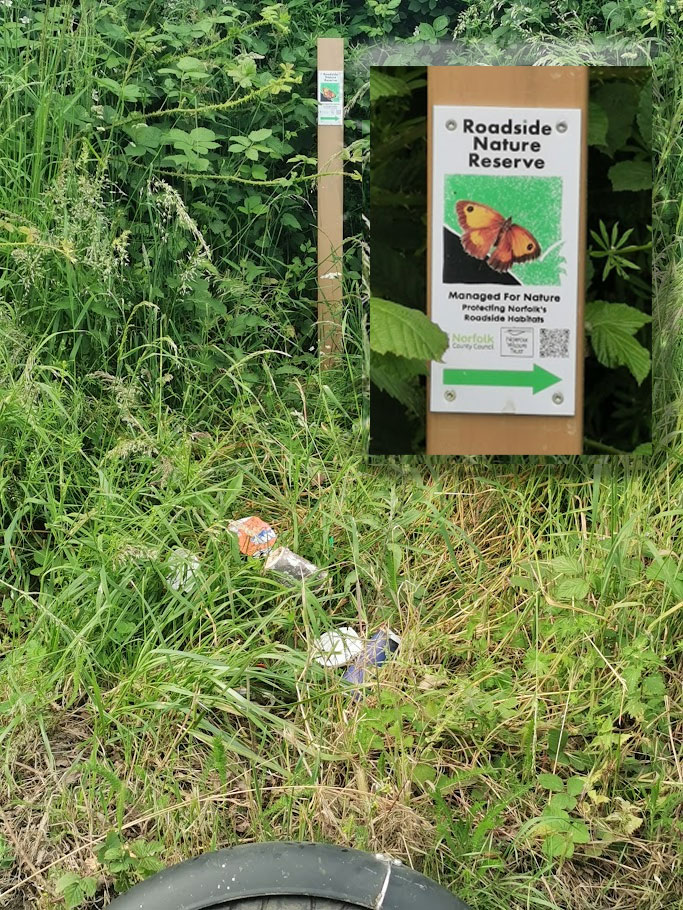LitterPicking (Again)
Every litter pick I do serves as a reminder of the culture we have in the UK. Whilst most people know littering is wrong, I suspect most think the solution comes from some council spending more on clearing up the mess. There are even some who feel throwing litter out of their cars is keeping someone else in a job.
There was something poignant about this month’s litter pick. I cleared a main road leading from the next village up to my own. As always I did it using my electric cargo scooter with the bins attached to it. It’s great for doing jobs like that!
Towards the end of the pick I came across rather a lot of rubbish that seemingly had been thrown out onto the grass verge in one go. It was a good assortment of cans (Red Bull, Fanta) and other drinks including Costa Coffee and Starbucks, along with their white plastic tops. What struck me however was in the background.

This little bit of the verge was a roadside nature reserve. In front of this sign was the rubbish. In front of the rubbish, I parked my electric scooter with the nearly full bins on board. Whilst trying to squash down the bin’s contents a lovely couple walked past and thanked me for the job I was doing. To be honest, I wish I wasn’t doing the job in the first place because I wished people wouldn’t throw rubbish from their cars. I wasn’t thinking about councils failing in any way, or thinking more funding would cure the problem, but I was dwelling on the broken culture meaning it continues to happen, everywhere.
The thankful couple and the organisers of the roadside nature reserve project are one very positive aspect of British society. However, the litterers are another showing itself by the abundant volume of litter lining most British roads. Yet, in the photo, you’ll notice another aspect of British culture that annoys me almost as much as the litter. It’s actually German, from Berlin. It’s beautifully engineered and a delight to use. Not only is it illegal in the UK, but that illegality also means Britain is denied having the opportunity for an innovative industry to manufacture its own.
That’s the rim of my electric cargo scooter. I bought it along with my other smaller electric scooter many years ago anticipating the legalisation change. With such a useful, environmentally friendly method of transport, I thought the legislation would change quickly. It is now June 2024. Using electric scooters is still illegal. If you do you are likely to be fined and potentially prosecuted. Why is the progress of such an obvious advantage so difficult in the UK? It made me think if bicycles were invented in the last decade the UK would still be trialling them well beyond the election in July.
So there I was, serving the local community and clearing up other people’s mess knowing I was breaking the law using a scooter. The other, more traditional electric scooter I have with tiny wheels, I couldn’t even use on British roads anyway because the cracks and potholes are too big.
In some ways, this is a slice of British culture. Crap roads, abundant litter thrown out by tossers who don’t care about anything other than themselves, threats of prosecution for not being compliant yet amongst all this are people who do care and are prepared to do something about it (at their own risk). Why is potential progress met with a deluge of fearful comments from people worried about how scooters could affect their nervous dogs on their daily walks?
A lady called Win in Brundall is getting rather old now, but she still takes it upon herself to walk around her village and pick up litter. Like me, she would rather not have to do it alone, nor have to do it in the first place. She’s not asked permission, done any training, filled a risk assessment or been equipped with any particular tools. She uses her push-along shopper lined with a bin bag. She even takes recyclable materials out of litter bins taking them home to sort out.
One of my ambitions is to change the culture in the UK for the better. I am unsure how to go about it. It is a huge motivator for me to think one day I can achieve something that honours Win’s work. She can put her feet up knowing her work is done and she, just an everyday person, played a part in making that change.
